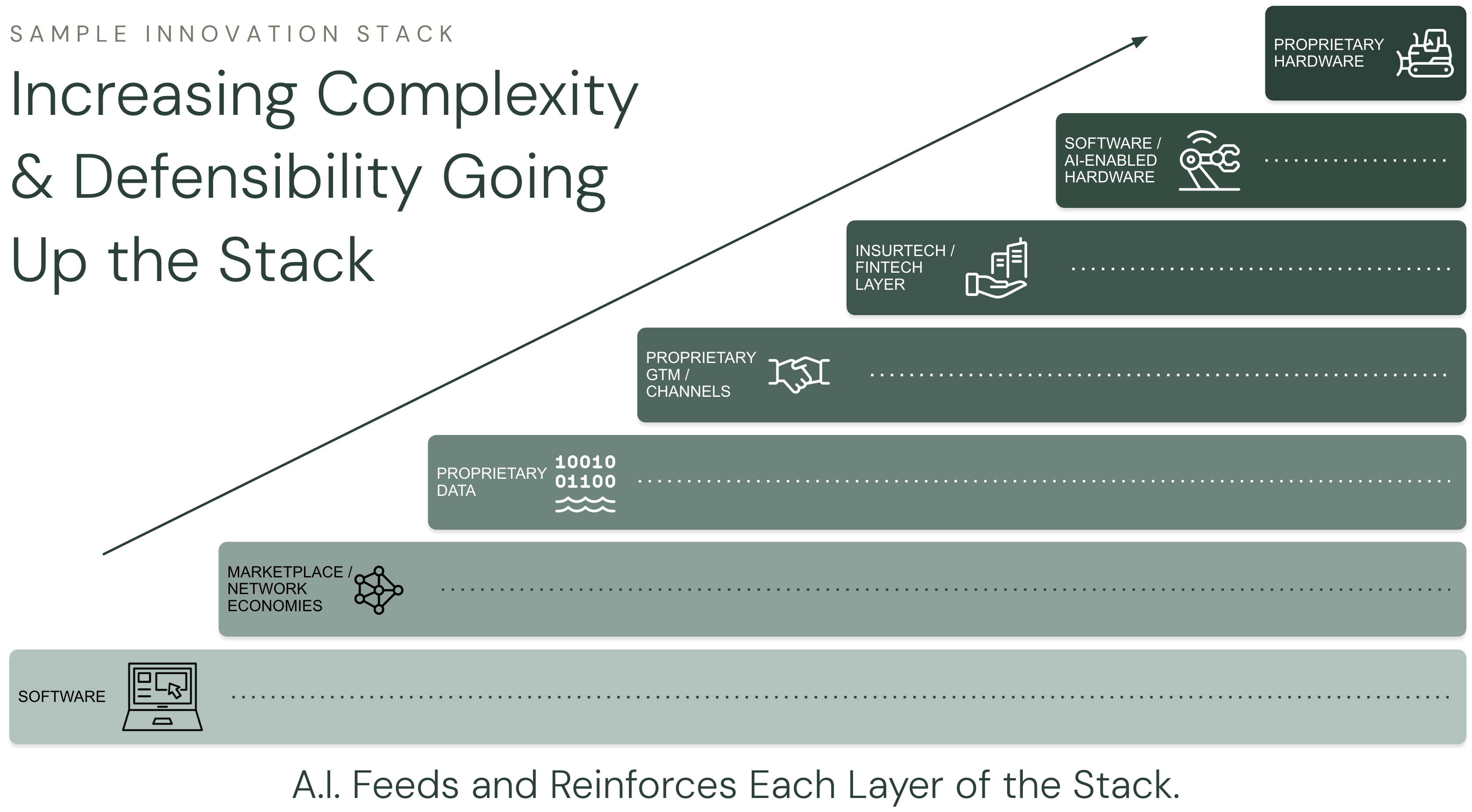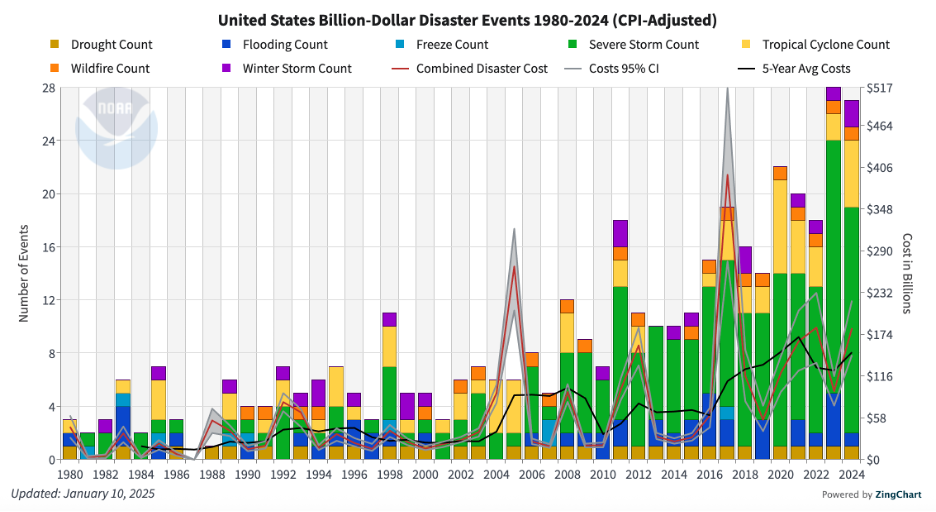AI x Climate Part 4: 5 Ways Climate AI Startups Can Build Value
By
Virta Ventures
ON
June 25, 2024

Welcome back to Virta Ventures’ AI x Climate series, a multi-part deep-dive into the intersection between AI development and the climate space. We previously covered what constitutes a Climate AI startup, AI-driven opportunities and challenges in the climate space, and tradeoffs in training a model from scratch. Today, we’re covering 5 key considerations for creating value as a Climate AI startup. Subscribe to our Substack to get our latest insights straight in your inbox!
Founders building a Climate AI startup or an AI-enabled climate tech startup can take advantage of AI as an intelligence layer to develop differentiated products that create enterprise value and positive climate impact. At Virta, we see a few key ways that startups building on the intersection of AI and climate tech can win and create lasting solutions driving positive change.
Building in Climate AI? Here’s what to consider as you build enterprise value:
Learn from Cross-Sector “Winners”
Across all industries, there are certain types of business models and strategy “playbooks” that have produced consistently outsized returns. We’ve seen equity-light models (e.g., SaaS, marketplace models, etc.) win in every other sector – of the top 30 unicorn companies ranked by valuation, around two-thirds operate equity-light business models. It’s logical that deploying similar models / strategies in the climate tech space can also lead to strong outcomes.
At Virta, we’re excited to see equity-light climate tech startups emerge as “winners” in the near future, and focus our investments on climate startups operating equity-light models. Equity-light businesses take less time and money to develop, iterate, get to market, and scale. Startups in the climate space building out equity-light business models will find that they can move faster and deploy their solutions more broadly across industries and sectors, driving accelerated positive climate impact. Building with AI will further accelerate their velocity of product development and climate impact.
Pursue Differentiation
We’ve discussed differentiation and defensibility in other installations of our AI x Climate series. At Virta, we believe that startups can achieve differentiation through the following:
Non-Technical Moats / Powers
Startups that have or can build Powers (from Helmer’s 7 Powers) such as Counter Positioning, Network Economies, or Switching Costs (somewhat technical) can create long-term market defensibility.
Data Access
Proprietary access to unique datasets allow AI startups to develop unreplicable insights and solutions, building barriers to entry and monetization potential as well as differentiation. (That said, startups pursuing proprietary data access from third-parties need to ensure exclusivity rules to secure differentiation.)
Startups can also build up their own unique proprietary datasets through hardware / software solutions. Proprietary datasets can improve data quality and generate even more unique insights vs. via proprietary data access. An example: at Virta’s SF Climate Week event in April, Shaurya Saluja, CEO of Virta portfolio company Fleet, talked about how Fleet was building up a proprietary dataset of commuter behavior that does not otherwise exist. Through this, Fleet is able to overcome roadblocks they previously faced with public transportation agencies’ lack of high-quality customer data and generate highly unique insights at the same time.
Proprietary Systems / Algorithms
By building a technological edge via proprietary systems / algorithms or proprietary data processing flows c/o layers of systems / algorithms, startups can build superior data insights and outputs, driving differentiated value creation.
Workflows / UI and Integrations
Novel AI-enabled workflows, UX, and integrations allow for unique B2B interactions that create a strong, differentiated customer experience that competitors will find difficult to replicate. Virta portfolio company Tyba, for instance, builds generative AI-enabled annotations for Tyba’s data insights dashboards. Through this, Tyba builds a differentiated customer experience that provides differentiated value to their renewable energy and storage developer stakeholders.
Go-to-Market Strategy
Startups can create competitive advantages by gaining access to a proprietary distribution channel / partner, creating a novel low-cost customer acquisition strategy, or discovering some other novel GTM strategy that can’t be easily overcome by better AI.
Human-in-the-Loop Applications
Combining AI technology with unique human insights, in a highly leveraged and novel way, can help startups develop more precise analytics and insights and stand out as an AI solution in markets where human judgment is still particularly valuable.
Unique Interactions with the Physical World
Finding new ways to leverage AI and technology to interact with the physical world and create novel insights and outcomes can help startups differentiate themselves from the competition. For example: by leveraging AI to parse through proprietary data, third-party data, customer photos, and more, Virta portfolio company Treehouse provides home electrification customers with instant quotes, permitting packages, and installation instructions that simplify an otherwise involved electrification process. Through this, they use AI to provide cost-effective and quick installation of products like home EV chargers in the physical world, delivering novel value to their customers.
Industry Expertise
Layering specialized industry-specific insights atop AI outputs can make AI-driven insights more valuable and salient for customers.
The best startups differentiate themselves with a combination of these elements.
Disrupt the Under-Digitized
In many other industries, incumbents can leverage their advantage of large domain-specific datasets to reinforce their competitive advantage through AI technology. For instance, companies like Amazon and Etsy have advantages vs. challengers in deploying AI within the eCommerce space because of the amount of domain-specific data that they’ve been able to amass over time.
However, under-digitized sectors in climate tech lack these types of digitized, data-driven incumbents. This is a ripe opportunity for climate tech startups to target under-digitized domains (energy, mobility, etc.) and speed past incumbent competitors with cutting-edge AI technology.
As mentioned previously, building proprietary datasets for AI use where digital datasets did not exist previously can help startups develop unprecedented advantages to disrupt under-digitized markets. Virta portfolio company Fractal digitizes farmland financials previously held in binders and file cabinets to power their AI underwriting, disrupting the under-digitized agricultural finance space that they build within.
Build Efficiently
At Virta Ventures, we believe in equity-light climate tech businesses that can stay nimble and iterate quickly due to AI efficiencies and low amounts of required equity investment. While AI can help all types of climate tech startups build more efficiently, AI can catalyze existing efficiencies in equity-light climate tech models to help businesses create value at unprecedented speeds.
Equity-light climate tech ventures already achieve high shipping velocity due to their ability to build in resource-light ways. AI helps equity-light startups iterate on digital products better and faster. Startups can build AI solutions that can help with code, UX, copy, and more into their development workflows to capitalize on AI’s potential as an accelerant for product growth.
That said, all startups building in climate or elsewhere, equity-light or not, can take advantage of AI capabilities to build efficiently. We believe that it’s table stakes for startups to use AI in their operations. The more a startup is able to leverage AI as it scales up, the more it is able to build a moat via its AI-unlocked efficiencies combined with its other competitive advantages.
Hire for the Future
Considering the scarcity of high-end AI talent, hiring needs to be top-of-mind for Climate AI startups when considering product strategy and the “to build or not to build?” AI model tradeoff. Foundational model development requires top-level talent – and if an organization is unable to hire this type of talent, it’s unlikely to be able to build AI models in-house. If a Climate AI startup has the capability to hire the talent required to build a foundational model, it should also consider how to future-proof its team with top talent that can add value today and adapt to add value tomorrow as technology rapidly adapts.
Even if a startup does not pursue in-house AI development, AI plays a major role in increasing productivity in teams – and startups should ensure that their teams are built in a way that allows them to take advantage of AI. Startups need to make sure that they are able to hire team members who are able to adopt AI workflows to move faster today, and adapt to learn new AI productivity tools so that they are able to stay on the cutting edge as AI tools improve in quality.
Subscribe to our Substack to keep up with future insights in our AI x Climate series. To get in touch, connect with us here.
insights
We regularly publish thought pieces where we share lessons from renowned investors and delve into strategies for investing in the transformation of vital physical industries.







